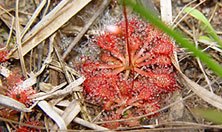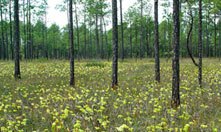
If you have questions about purchasing a license call 1-800-5GO-HUNT.
The Natural Heritage Program manages a comprehensive database on Mississippi's species, biological communities, ecosystems, and natural areas of conservation concern. Information on the distribution, biology, and status of these elements is acquired and used to guide conservation action and facilitate wise management of Mississippi's land and water resources. A primary objective is ensuring that the database is scientifically credible, current, accurate, and readily available for use by resource managers and land developers.
The Natural Heritage Database is a continuously updated inventory of rare plant and animal species and representative natural communities in Mississippi. Since 1976, the Mississippi Natural Heritage Program has been gathering information on the occurrence and status of rare species and other elements of natural diversity, with the goal of identifying, systematically and objectively, the state's most significant natural features.
Today current information on the statewide status and locations of special animals, plants, and natural communities is available in a central location. By using the Heritage Program, resource planners are able to save time and money.
The information contained within the Program's database was compiled from a broad range of sources, including museum and herbarium collection records, publications, unpublished reports, and experts throughout the southeast. Guided by the information thus compiled, the Natural Heritage Program conducts considerable field research every year to build the database and keep it current.
Field surveys to find and verify specific locations of the elements of highest priority and to collect accurate information on the condition, quality and management needs of these elements are conducted by staff members, contractors, and volunteers. The use of cross-referenced manuals, maps, and computer files provide a flexible data management system from which information is easily accessible. Data can be retrieved from these files in a variety of formats tailored to the varying needs of different users.


Mississippi's natural heritage can be preserved without minimizing social and economic development, as long as all interests are considered. The information yielded by the inventory can make possible objective decisions about which land is suitable--or unsuitable--for development. The protection of Mississippi's natural heritage can be accomplished in harmony with other human concerns if planning accompanies growth. Information from the database facilitates the sound evaluation of lands and the focus on the most threatened significant natural areas.
By consulting the database early in the planning process, planners can avoid sometimes costly conflicts. The Natural Heritage Program can determine whether the intended location for a given project includes the habitat of an endangered species, habitats of other species of concern, or other exceptional natural features.

A quick initial assessment based on the Natural Heritage database expedites the review process. Staff members can determine whether on-site environmental assessment is still needed (i.e., if no information is available on the site) and can provide guidelines on what to look for and techniques to use. The names of biological consultants may be provided by the MMNS Staff.
By using MNHP data, conservationists are better able to focus their preservation efforts on those elements that are most critically endangered.

Research and Education Consultation with the Natural Heritage Program helps researchers take advantage of existing knowledge and plan research priorities. By using the information on special elements, environmental educators are able to teach environmental conservation and the value of protecting Mississippi's natural diversity.
Simply, the best decisions are made when the most information is available. In the past, the lack of this information severely hampered the decision-making process. By offering a scientific overview of Mississippi's natural assets, the Natural Heritage Database enables our citizens to chart the course of development wisely.